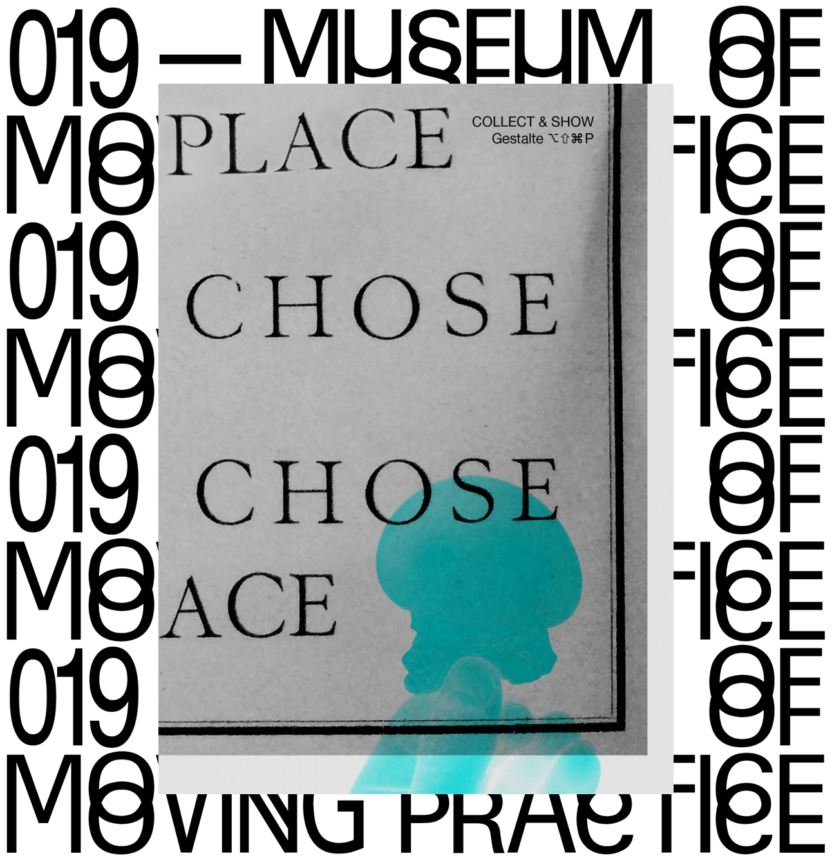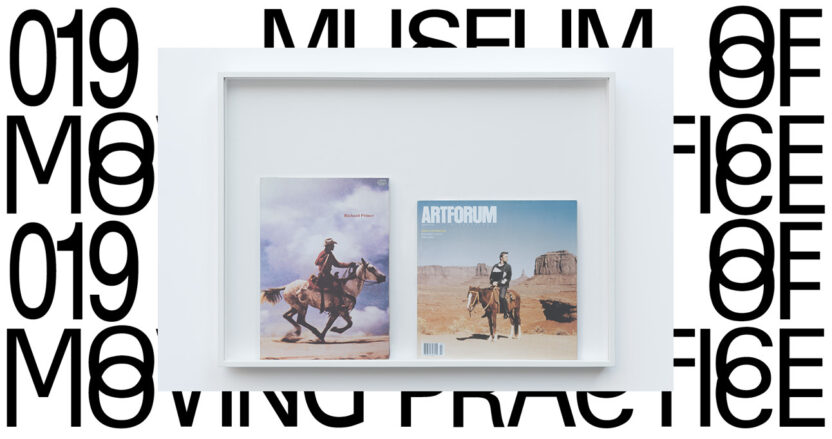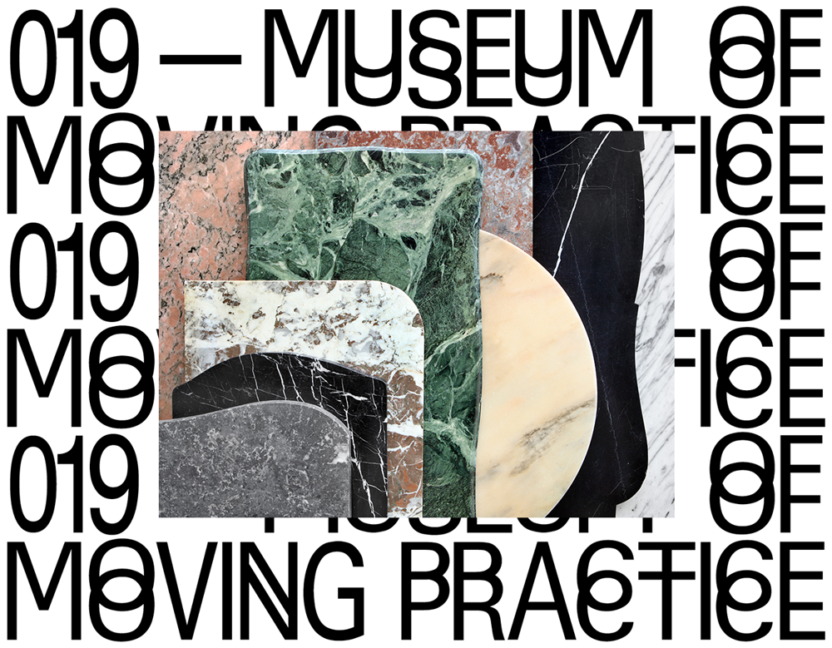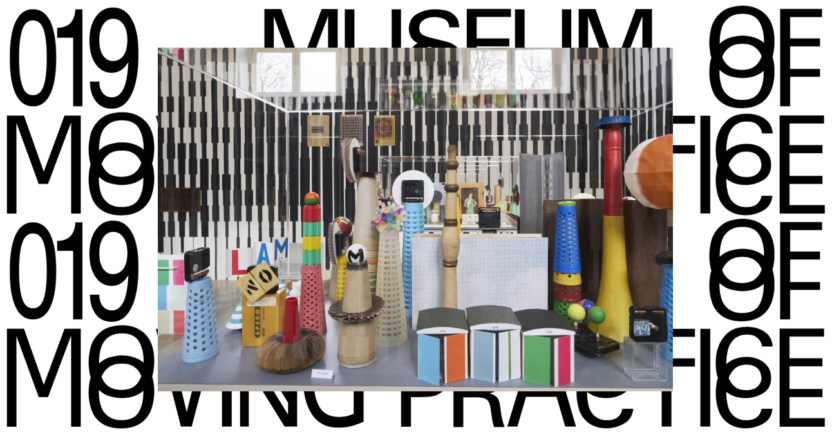
Museum of Moving Practice
following the East Flanders Provincial Award for Design
The 019 collective, winners of the East Flanders Provincial Award for Design, will be temporarily taking over the historic Hotel De Coninck premises with their Museum of Moving Practice, in the guise of welcome squatters.
During the summer of 2017, 019 occupies a wing of Design Museum Gent following their first price in the Provincial Award for Design. The collective closes the doors on their current location from May to September and moves its entire operation. We asked them not to create a traditional exhibition about their own work, but rather to play with the relationship between inside/outside and to highlight an aspect of design which is not featured in the museum very often, namely graphic design.
019 explored the building and made it their own. However, they are not doing so along the traditional front of the building but at the rear of the museum on the currently undeveloped plot in Drabstraat. They are building a 16-metre tower, an imaginary spot where a landmark should be built one day, literally creating a new temporary entrance to the museum through a hole in the temporary wall. 019 are shifting their identity from DOK Noord to Design Museum Gent and are communicating a positive story to the public in the heart of the tourist district of Ghent, but in an place which is currently fairly desolate and almost a blot on the urban landscape. They are achieving this by means of the tower/totem and billboards on the provisional façade. As nominees for the East Flanders Provincial Award for Design, they will not be displaying their own work but will organise/curate various exhibitions and develop an active artistic programme over a period of 4 months.
So, Design Museum Gent will have guests, but the host and guest roles are not that easily defined. The museum is invaded but only by welcoming invaders: 019 in turn invites different artists and (graphic) designers to create and present work. That way, a diverse collective contributes to the new temporary platform: 019 — Museum of Moving Practice.

Programme

Gestalte (BE): Collect & Show
Exhibition: 19 May—1 September
Gestalte, graphic design agency, occupies the Empire room during the summer
invasion of the 019 collective with Collect & Show, a book and installation that
both provide an insight into the work of the designers.
The workshops of Gestalte are a laboratory for formal research. In this
environment, inspiration and creation come together. The presence of objects in
their work environment and in the museum’s collection is the shared narrative. Everyday objects are
linked to pieces from the museum collection. Those links are not grounded in an historical context
but based on an intuitive choice.
The many visits to the museum depot resulted in astonishment and moreover in a feeling of
recognition. Prototypes and models reflect the same search for the right kind of form and application
that designers go through in their work process. Colour and materiality express emotions and
aspirations, tools that designers also use in the process towards a publication.
The book shows the museum’s collection items in relation to the workshops of Gestalte and their
work of the past 20 years. In addition to this imagery, Paul Vermeulen, architect and essayist, writes
a text about the triviality of a masterpiece, about finding ‘things’ and the need to collect.
Publication and installation are part of Gestalte’s nomination for the Provincial Award for Design East-Flanders 2016.

Moritz Küng (CH): Selección Natural – This is the Cover of the Book
Exhibition: 19 May—22 June
The exhibition Selección Natural – This is the Cover of the Book presents sixty-six books published by artists, photographers,
academics and curators, all of them involved in artists’ book
publishing. The selection of books, all released in the past five
decades, doesn’t want to give an historical overview on the
contemporary art production in this field, but rather to highlight a tautological, self-referential and
witty game of visual, conceptual and content based correspondences.
The title quotes two books that could be considered as parenthesis or strategic references. The
seminal work ‘Book’ by American Fluxus artist George Brecht, made in 1964 and published in 1972 in
an edition of only 50 copies, reduces the object and content of the printed matter to its bare
essence. While the clothbound cover states in embossed uppercase This is the Cover of the Book, the
interior contains eighteen sober descriptions on 28 pages that explain the nature of each single page.
In contrast to this self-referential work, the publication by Peruvian Sandra Gamarra, Selección
Natural (2009), embodies a critical appropriation. The artist cloned the 640 pages long anthology Art Now. 137 Artists at the Rise of the New Millenium in her painterly style and reduced its content
to only 28 pages – the number of represented women artists. Here, the book becomes a sociocultural
and political manifest that questions gender inequality and the rules of the art market.
All books in this exhibition are presented in pairs and displayed in custom made frames to highlight
their status as works of art. The numerous combinations suggest different analogies in visual
communication and conceptual approaches, to the point where the book reaches a meta-state. Even
though this way of presenting may at first seem restricting, limiting and introspective, it opens up a
wide and diverse panorama in the realm of self-representation, appropriation, imitation and
repetition. The book(s) on these covers as well as the combined book covers become alter egos –
agents, so to speak – that promote themselves and their very existence as artists’ books.
Exhibition produced by CCL–Blanquerna (Madrid) in collaboration with Arts Santa Mònica (Barcelona), presented in Ghent in collaboration with Bepart, Platform For Contemporary Art (Waregem), GABF–Ghent Art Book Fair & Riot (Ghent)

Filip Dujardin (BE): Accumulation d'Époque
Installation: 19 May—22 June
The use of marble in applied art and architecture has a long history.
Although the timeless natural material is processed in different ways,
it’s always based upon its unique colour and drawing.
The spatial installation Accumulation d'Époque departs from marble
plates originating from the collection of Design Museum Gent and the
personal collection of the artist.
The collection of plates will be set up in a different constellation at four moments. As you would
expect from a museum, the idea of archiving, cataloguing, inventorying and presenting the plates is
taken as a starting point for spatial compositions. In that way, sequences will develop that compress
shapes, styles and colours in one motion.

Karel MartensKarel Martens (NL): Motion
Exhibition: 29 June—30 July
Karel Martens has ten hands for every finger. He’s an artist, a
typographer, a graphic designer, a bookmaker, and an educator. He
co-founded a school. He’s influenced thousands. Motion will afford a
compound view on an expansive practice, and chart a road map. Yet
while all of that spans over 50 years of Martens’ inter-disciplinary
activity, the exhibition will remain grounded firmly in the present (and future).
The exhibition will include some representative works – mono-prints of and on found materials,
paper reliefs, videos, modular wallpapers, kinetic sculptures and very early optical work. Consider all
of that a contextual substrate that corroborates Martens’ responsive and systematic approach to
colour, format, type and material.
His immense influence as an educator will be centrally positioned within the exhibition, with a
selection of publications by his former students displayed on tables Martens designed for the
Werkplaats Typografie in Arnhem, NL (the school he co-founded in 1998).
The primary focus will be on Martens’ most recent work, with several new commissions – wallpaper
made up of multicolored icons, interactive video projections and a massive abstract clock. These
works were produced for the exhibition, while existing works are being specially reconfigured. It will
be immersive – with colour inversions over entire spaces, multiplied by real-time mirroring and
attuned with technique, systematic seriality, conceptual operations and a multi-functional zone.
Motion is not intended to display Martens’ practice, but instead as an embodied demonstration of
his method.
Visiting information
Museum of Moving Practice
18.05.2017 – 17.09.2019
Open on weekdays from 9:30 until 17:30
Open on weekends, on public holidays and during school holidays from 10:00 until 18:00
Closed on Wednesday
Sandra Plasschaert
Cats Communication
Press & PR
+32 479 35 10 39
sandra@catscommunication.be
Bernadette De Loose
Design Museum Gent
Education & communication
+32 9 267 99 99
bernadette.deloose@gent.be